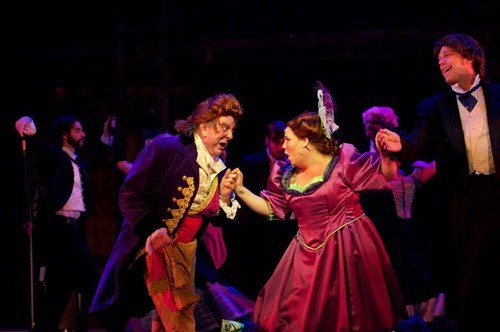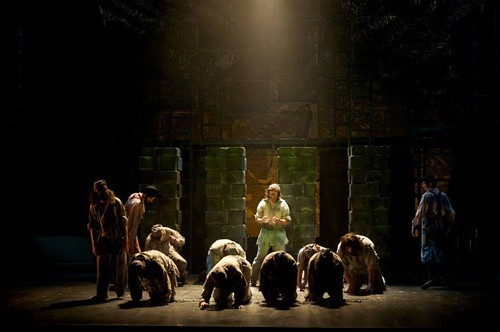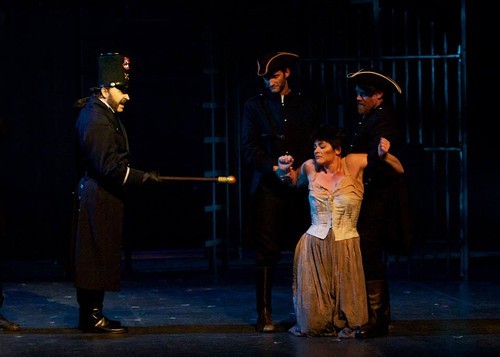
- Chris Neely
- Zimmerman and Oliver attempt to steal a show
Could it be that the potency of Les Miserables has been dampened by too much spectacle in previous incarnations? Will it only live up to its real potential as regional playhouses reconsider theatrical priorities, and work to fit the epic musical onto smaller stages?
The grandest thing about POTS triumphant (yes, I said triumphant) production of Les Miserables (other than the costumes, perhaps) is a nearly complete absence of grandness. Mark Guirguis’s scenic design is too useful and sturdy to inspire much awe. Sets are subtle and constructed with actors top-of-mind, not theater tourists. This is the perfect stage for a performer’s production of a show that, in its heyday, defined the modern, spectacle-driven mega-musical, while standing head and shoulders above most of its big budget peers. Instead of investing in technological marvels POTS director Gary John La Rosa has doubled down on the power of good singing, unfussy acting, and clear storytelling. To do so, he’s brought together some of the best voices I’ve encountered on a Memphis stage. Or any stage for that matter. The big payoff is an evening of genuine intimacy from a show that usually overwhelms.
Performances by leads and chorus members alike are first rate and fully packed. Jordan Nichols, a veteran of a retooled and re-launched Les Miz national tour, wears the role of Marius like a comfortable suit, but he’s only one bright light among many. Regional favorites Ken Zimmerman and Courtney Oliver are deliciously seedy as Thenardier and his Madame, who cut purses, rob corpses, sell sin and profit at the margins in war and peace alike. If this were a Disney cartoon these survivors’ survivors might be played by a pair of sharp-toothed sewer rats, and something very near that level of anthropomorphism occurs each time Oliver and Zimmerman scamper onto the stage. Yet they remain all too recognizably human.
Claire Hayner, a statuesque performer known for playing strong female roles, is uncommonly vulnerable and heartbreaking as Fantine and Michael Detroit gives a credible, no nonsense performance as the undeveloped lawman, Javert. This is Jean Valjean’s show, of course, and with his powerful build and angel’s voice Philip Andrew Himebook makes that perfectly clear every time he walks on stage. I can’t say when I’ve heard the role better sung.
The great performances don’t stop there though. Josh Quinn’s Enjorlas is a fiery revolutionary, too busy and driven for romantic poses. Chuck Hodges, who recently took home a best actor Ostrander for his performance as Tevye in last season’s Fiddler on the Roof, firmly establishes the show’s well-sung but plainspoken style early in the show as a Bishop who offers Valjean a second chance.
POTS Les Miserables isn’t just populated with great voices. These are voices — human and orchestral — that sound fantastic together. The 2012-13 Ostrander Awards have only just been handed out and already I’m certain that Renee Kemper has secured next year’s prize for music direction.
Victor Hugo’s monumental story about a man imprisoned for stealing bread, and stalked across decades by an unrelenting police officer while violence and rebellion breaks out all around, had to be cut to pieces to fit inside a noisy three hour musical. Like some gigantic clown car gag, so much story, and so many characters are crammed into so little space and time Les Miz is forever struggling at the edges of coherence and cohesion, and I’ve always wondered, should the spectacle ever be removed, what glue might hold all the shards of this sprawling thing together. The answer was there all the time
With notable exceptions, Claude-Michel Schönberg’s compositions work more like a movie’s soundtrack than a musical’s score. They speak a language we’ve all grown up with, and use a grammar we instinctually understand. The music fills cracks in the storyline with passages that tell us how much time has passed between scenes, and exactly how to feel about it. In grander productions these sweeping manipulations feel like so much cheating. With spectacle so dialed back, the soundscape becomes the landscape. Suddenly this mega-musical takes on a more decidedly human scale and becomes a storytellers play. As feats of stage magic go, that’s way more impressive than a big mechanical barricade.
This production should thrill fans and surprise skeptics. If The Color Purple and Angels in America didn’t convince Memphians that Playhouse has upped its game, this should do the trick.

- Chris Neely
- Misery in action
For ticket information, this is the CLICK you’re looking for.
